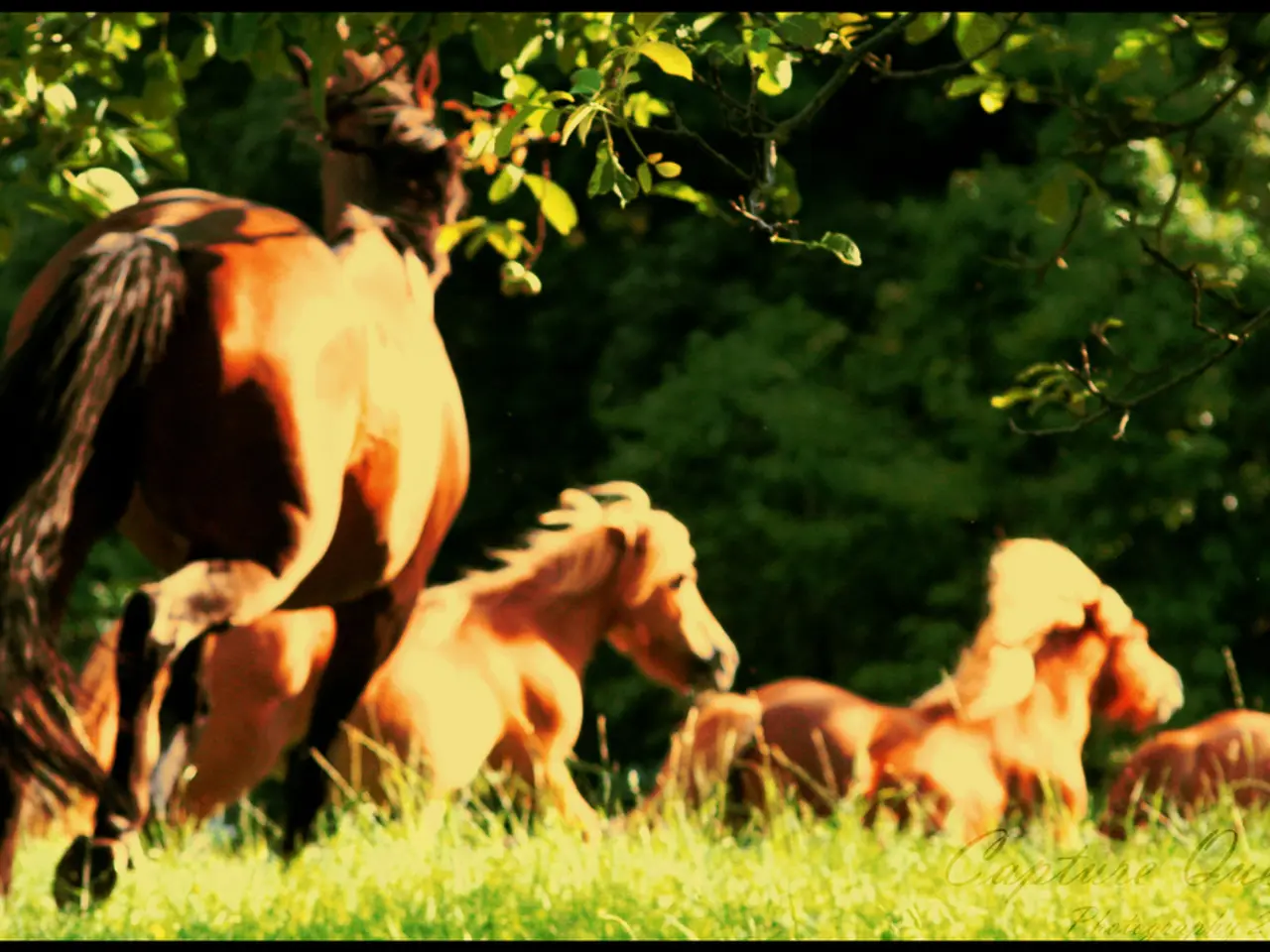Artificial Intelligence and Predictive Analytics Shaping the Evolution of Equine Breeding in the Coming Years
The world of horse breeding is undergoing a significant transformation, as AI algorithms and predictive analytics are being integrated into traditional practices. This shift is reshaping the landscape of equine breeding, with a focus on health, longevity, and precision in genetic selection.
Horse breeding, a blend of art and science, is now benefiting from the precision of data analysis. AI algorithms analyze vast amounts of data to identify optimal breeding pairs, helping breeders make more informed decisions. These advanced techniques are utilized in forecasting outcomes in equine health and performance prediction.
One of the key advantages of this new approach is the ability to reveal patterns that humans might overlook. Machine learning can assist in assessing which traits will provide the best results, allowing breeders to make informed decisions about which horses to pair for optimal genetic selection. This, in turn, is improving breeding optimization, making the process more efficient and leading to better equine health and performance.
Predictive analytics and AI are emerging tools that can enhance breeding strategies in horse breeding. They help breeders make smart choices by identifying which traits might lead to better equine performance and overall health. These tools are increasingly crucial in modern breeding practices, supporting real-time data collection and elevating breeding efforts.
The future of horse breeding appears bright, with the combination of AI and big data leading to smarter breeding decisions. Big data has the potential to transform horse sports, revealing connections between genetic factors and performance outcomes. Machine learning algorithms can analyze vast amounts of data to identify breeding trends that may have gone unnoticed.
Reproductive technologies, such as artificial insemination and embryo transfer, are becoming more common in horse breeding, expanding the gene pool for genetic selection. AI adoption grows by providing access to superior genetics regardless of geography, supported by improved cryopreservation and reproductive technologies such as sexed semen and embryo transfer. AI also reduces natural mating injuries and improves reproductive efficiency.
Inspired by practices in other livestock sectors, AI studs manage genetics from birth, selecting promising animals very early, improving the genetic pool for breeding programs. Data-driven breeding management, performance tracking, and market valuation are also being enhanced by the integration of predictive analytics and AI-driven platforms. This facilitates greater transparency and international benchmarking.
However, breeders face numerous challenges, including maintaining equine health amid evolving breeding trends, rising costs, and difficulty utilizing machine learning effectively for data analysis. Ethical considerations will shape breeding practices, ensuring the welfare of horses is prioritized.
Despite these challenges, the future of horse breeding is promising. Ongoing improvements in data-sharing protocols, standardized phenotyping, and international collaboration promise continued growth and efficiency in horse breeding globally. Tailored breeding programs focusing on individual horse needs and strengths may become the new standard.
In conclusion, AI and predictive analytics are enabling a shift from traditional, experience-based breeding towards systematic, data-driven approaches that promise faster genetic improvement, higher offspring performance, and more informed market decisions in the horse breeding industry. Embracing innovations in equine breeding, such as predictive tools and AI, is essential for growth and success in the industry. Technology helps identify potential health issues before they arise, ensuring better care for the animals. Genetics significantly influences breeding outcomes in horse breeding, with choosing the right pair improving performance in horse sports. Data analysis plays a critical role in enhancing decision-making in horse breeding, allowing breeders to gain insights into genetic traits and backgrounds. Success rates are rising due to advancements in genetic selection, enabling breeders to focus on traits that enhance performance in horse sports. Data-driven decisions are expected to increase in the future, with machine learning playing a large role in analyzing genetic data.
[1] Henderson, J. B., et al. (2017). Genomic selection in horse breeding. Animal Genetics, 48(5), 498-507.
[2] Janssens, I., et al. (2017). Genomic selection for complex traits: an overview of methods and applications. Genetics Selection Evolution, 49(6), 55.
[3] Kemperman, R. E., et al. (2016). Genomic selection in horse breeding: the first decade. Trends in Genetics, 32(11), 712-722.
[4] Klieve, H., et al. (2017). Genomics and the future of horse breeding. Animal Reproduction Science, 176, 1-12.
[5] Lund, M., et al. (2017). Genomic selection in horse breeding: a review. Journal of Heredity, 108(5), 478-486.
Sports, a popular equine discipline, may significantly benefit from the advancements in horse breeding. With AI algorithms and predictive analytics aiding in genetic selection, the focus on health, longevity, and performance in horse breeding can extend to the sports industry. Improved breeding practices lead to horses with superior athletic abilities, thereby enhancing their performance in sports.
Machine learning, assisting in assessing genetic traits, offers the potential to create custom breeding programs tailored to individual horse strengths, which can be a game-changer in competitive sports. This data-driven approach could ensure horses are optimally matched for sports events, thereby boosting their chances of victory while maintaining their overall health and well-being.






